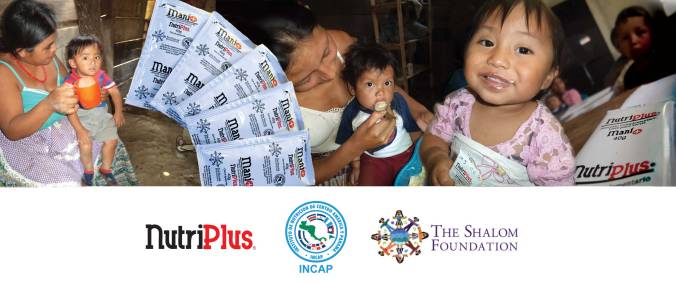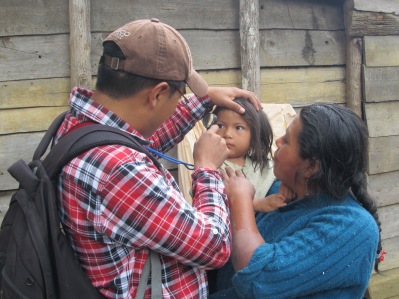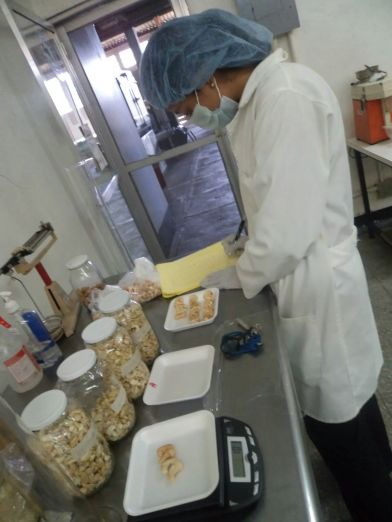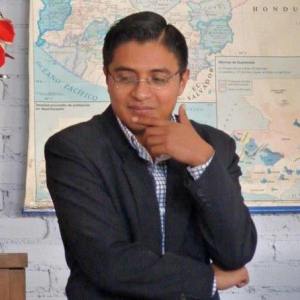
Mani+/NutriPlus has developed a Ready-To-Use Supplementary Food (RUSF) that rapidly and effectively combats the specific forms of malnutrition found in Guatemala
“I cannot fail. There are no second chances”, said Miguel Cuj: Director of Research and Nutritionist for Mani+/Nutri Plus., Guatemala
Bright Star Grant Consultants Vice President, Janet Bourque, met Miguel in January 2011 when she volunteered to teach conversational English to Mayan university students in a program sponsored by the Maya Education Foundation in Antigua, Guatemala. Miguel is an exceptional scholar that has played a “game changing” role in relationship to hunger and malnutrition in Guatemala. As a professional colleague and friend, Miguel shares with Bright Star Philanthropy Partners our goal of shared value solutions in collective impact poverty alleviation through innovative solutions to hunger and malnutrition.
Miguel entered and graduated from University at a time when the percent of Mayans with this achievement was so small as to be hardly counted. He accomplished this through determination, passion for making a difference in the lives of his Mayan country men, and support from organizations and mentors who recognized his brilliance. His story is one of inspiration for Mayans and for those who support them. Here is Miguel Cuj’s story, in his own words:
“I was born during a civil war. Fear and hunger were the everyday experiences of my childhood. In my own personal and professional experience as a Maya person in Guatemala, I see that my country still suffers from violence, racism, social and economic inequality, although the conflict officially ended in 1996 with the Peace Accords. It is for this reason that my interest developed in the holistic, qualitative and quantitative social health of my country. I would like to further my research into the political, economic, and social causes that result in the high rates of malnutrition in Guatemala. “
“In 2005, I was accepted into the Nutrition School at San Carlos University of Guatemala. In the first year I was supported by my parents. In the second year of University (2006-2007), I was admitted to the San Carlos University scholarship program. Due to my high academic performance and low social economic status, the University recommended me for a scholarship from Maya Education Foundation Guatemala (FepMaya), which supported my studies from 2008 until 2010. It was a beautiful experience because FepMaya also helped me understand and appreciate my Maya identity and the socio-cultural context in which I grew up. During this time I started my research field work on the relationship of social science and food and began to be interested in a social program regarding food availability and malnutrition in rural Guatemala. “
Research into Nutrition Interventions

Miguel Cuj participated in rural training on social nutrition in San Juan Chamelco with Food For the Hungry
“In 2010, I participated in rural training on social nutrition with Save the Children International for six months in Uspantan (a Guatemalan rural indigenous town). This experience taught me many things about the Maya K´iche culture and their many problems related to food and health. This point started my understanding of how the culture influenced the knowledge, behaviors and practices in the access to food. My main point of interest was whether or not the people knew of the many foods available, and I found that the socio-economic and education levels are important factors in the food choices that result in the consequence of the malnutrition status.
In 2011, I was awarded a research fellowship from the Cardiovascular Surgery Unit in Guatemala (UNICAR) in Tobacco Control supported by the International Development Research Centre (IDRC). My mentor was Professor Joaquin Barnoya of Washington University and we worked with medical anthropologists to study the use of tobacco among traditional Maya midwifes. This work furthered my deep interest in the social anthropology of hunger and illness and the challenges for the people of low social economic status. I presented a poster presentation on the knowledge and practices of midwives and tobacco use at the Latin American Congress in Peru.”
Partnerships Across Sectors to Achieve Results
“Since January 2012, I have worked with Professor Edward Fischer of Vanderbilt University on a research program regarding social nutrition. The Mani+ Project is an association between Shalom Foundation and the Institute of Nutrition of Central America and Panama. I have developed a Ready to Use Complementary Food, designed to meet the specific nutritional needs of chronically malnourished children in Guatemala. The uniqueness of this research is that I took into account the quantitative health issues: health status, malnourished status. In addition, I have researched the qualitative social determinants for the rural Guatemalan countryside: languages, behaviors, attitudes, and other social issues that establish the holistic problem of the hunger in Guatemala.”

Mani + Innovation in Food Science Award, Costa Rica Maria Jose Gallardo, Director to Shalom Foundation and Miguel Cuj, Director of Research and Nutritionist
Academic Standards for Research
“I have completed two years of nutrition research field work in Guatemala regarding the problem of hunger in rural areas. The 66th World Health Assembly of WHO focused on the social determinants of health. The social determinants of health are the conditions in which people are born, grow, live, work and age. These circumstances are shaped by the distribution of money, power and resources at global, national and local levels. Several countries in Latin America have social characteristics in common: low-income and middle-income economies, high level in malnutrition, illiteracy, and young pregnant women that are key important issues for the development of healthy societies.
Recent research reported in The Lancet shows that interventions supported by social and health research are the best approach to reduce chronic malnutrition. Countries like Brazil and Mexico that have implemented policies for the fight against hunger considered social issues to develop social policies that improve the nutrition and health status in the population.”
Thought Leadership in Innovation
“With my academic formation and nutrition degree in Guatemala, I can understand the clinical problem of the malnourished. But hunger is a social problem. For me, the key to a holistic understanding of chronic malnutrition is further study in the social sciences. My academic skills in nutrition knowledge combined with resources in social science would allow me to research the social causes and effects of malnutrition.
I am ready to further my research. I want to increase my knowledge of the social research sciences because I have been shown the importance of the social problems in the big challenge to eradicate hunger. I want to use my research skills and my knowledge of social determinants to provide the basic data for changes in government policy as well as implementation for the hungry rural indigenous populations.”
Mani+/NutriPlus
Mani+ is a program in Guatemala that develops and produces locally sourced complementary foods. Mani+/NutriPlus has developed a Ready-To-Use Supplementary Food (RUSF) that rapidly and effectively combats the specific forms of malnutrition found in Guatemala through a balance of protein, calories, and micronutrients. Founder of Mani+ is Edward F. Fischer Professor of Anthropology and Director of the Center for Latin American Studies at Vanderbilt University. Founder of The Shalom Foundation, Steve Moore, is the co-founder of Mani+. For more information about their research contact Miguel Cuj, (miguel@maniplus.org) For more information about Mani-/NutriPlus, please see their web site: http://www.maniplus.org/
Mani+ Nutri Plus Awards:
The Littlejohn Undergraduate Research Award.: The Littlejohn Undergraduate Research Award seeks to support undergraduates with an active role in general research
NutriPlus: Awarded Luis Fernando Arias Molina Prize, 2014
NutriPlus: Guatemala’s National Innovation Competition, Second place award
.
Miguel Cuj – Director of Research and Nutritionist (miguel@maniplus.org)
Miguel has a degree in nutrition science from the Universidad San Carlos de Guatemala which was supported by the Maya Education Foundation. He has also held a fellowship position in tobacco control at the Cardiovascular Surgery Unit of Guatemala and has worked on nutrition projects with Save the Children and the Conferencias de Iglesias Evangelicas de Guatemala. Miguel is from San Lucas Toliman; he speaks Kaqchikel Maya, Spanish, and English.


